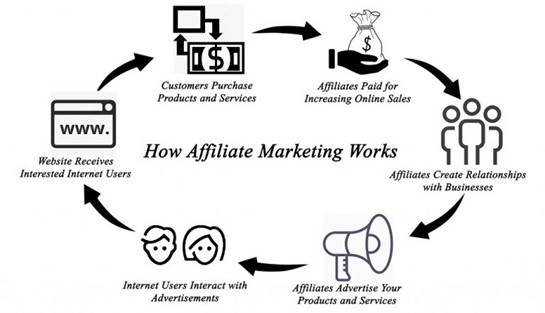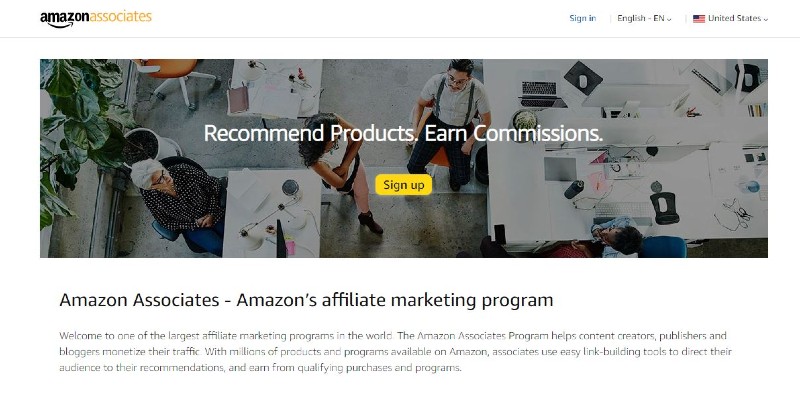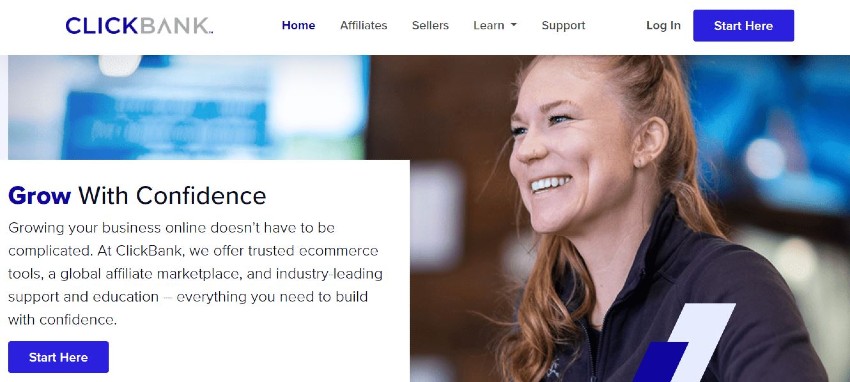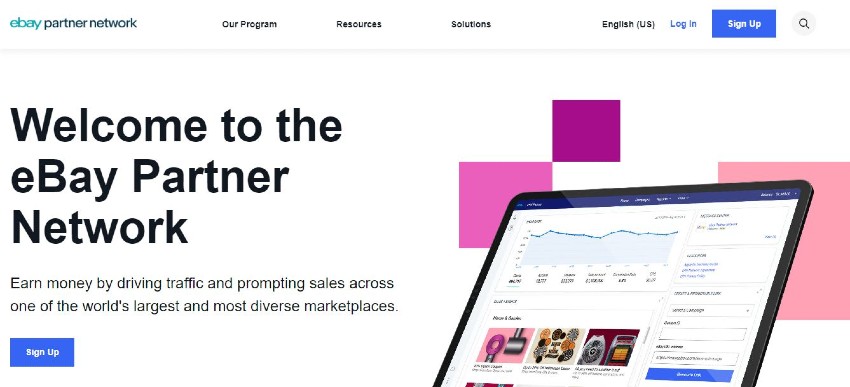Affiliate marketing has become a popular way for individuals to earn passive income online. It involves promoting products or services for a company and earning a commission for each sale you helped create. Beginner affiliate marketing can be a great way to start earning extra money, but it is important to understand the basics of the process before getting started. Be sure to check out my Number 1 Recommendation.
The first step to getting started with beginner affiliate marketing is to choose a niche or industry that you are interested in. This will help you to select products or services that you are passionate about promoting. Once you have chosen a niche, you can begin to research potential affiliate programs or networks that offer products or services that align with your interests. It is important to choose a program or network that offers high-quality products or services that are relevant to your niche. More on niche selection later.

Once you have identified a few potential affiliate programs or networks, you will need to apply to become an affiliate. Some programs may require you to have a website or a certain number of social media followers, while others may have more lenient requirements. It is important to read the requirements carefully and ensure that you meet all of the necessary criteria before applying.
After you have been accepted into an affiliate program or network, you will be given a unique affiliate link that you can use to promote products or services. This link will contain a tracking code that will allow the company to track sales that are made through your link. You can promote your affiliate link through your website, social media accounts, email marketing, or other marketing channels. Want to learn more about what affiliate marketers do? Click Here: What is Affiliate Marketing?
Affiliate Program VS Affiliate Network
It is important to note the difference between an affiliate program and an affiliate network. An affiliate program is run by a single company, and affiliates earn a commission for promoting that company’s products or services.
An affiliate network, on the other hand, is a platform that connects affiliates with multiple companies that offer affiliate programs. Affiliates can sign up for multiple programs through the network and earn commissions for promoting products or services from multiple companies.
There are many affiliate programs available for beginners, but it’s essential to choose the right one that matches your interests, niche, and target audience. Here are some of the popular affiliate programs that are suitable for beginners:
Amazon Associates: Amazon Associates is one of the most popular affiliate programs that is beginner-friendly. You can promote any product from Amazon’s massive catalog and earn commissions on any sale you generate. While arguably the largest affiliate marketing program available, there are pros and cons to Amazon Associates – more on this later in the article. Be sure to review my article on Amazon Arbitrage.

ShareASale: ShareASale is another popular affiliate program with over 4,500 merchants to choose from. They offer a wide range of products and services that cater to different niches and audiences. Additionally, ShareASale is one of the few two-tiered affiliate networks available – meaning, if you can entice other affiliate marketers to join through your link, you can earn a percentage of their affiliate sales.
ClickBank: ClickBank is a digital marketplace that offers a vast range of products that you can promote as an affiliate. They have a user-friendly platform, and you can earn up to 75% commission on every sale you generate.


CJ Affiliate: CJ Affiliate (formerly Commission Junction) is an affiliate network that connects you with various brands and advertisers. They have a wide range of niches and products that you can promote, and they offer excellent reporting tools to track your performance.


eBay Partner Network: eBay Partner Network is an affiliate program that allows you to promote eBay products and earn commissions on any sale you generate. They have a vast selection of products, and you can earn up to 70% commission on specific categories.


Choosing the right affiliate program for beginners can be challenging, but with the right research and understanding of your audience and niche, you can succeed and make a steady income as an affiliate marketer.
How to Choose your Affiliate Marketing Niche
To begin affiliate marketing is rather easy. However, choosing the right niche is crucial for beginner affiliate marketing because it affects the success and profitability of your affiliate business. Let’s delve into how to choose a good niche for beginner affiliate marketing.
Note: Don’t overthink niche selection. Diving in and getting started is the most important part of beginning in affiliate marketing. So many beginners get stuck on niche selection – worrying about picking the wrong niche. Because of the experience and knowledge you gain from your first affiliate venture, you’ll be able to take off on another at least 10 times as fast.
The first step in niche selection is to determine your passions, experience or strong interests. You should choose a niche that aligns with your interests and passions because this will help you create valuable content that resonates with your audience and avoid burnout in the long run. When you are passionate about your niche, you will be motivated to create content, promote products, and engage with your audience.
Be Sure to Review: Top Affiliate Niches
The second step is to research the market demand. You should look for niches that have high market demand and low competition. You can use tools such as Google Trends, Amazon Best Sellers, and keyword research tools to identify popular niches. These tools will help you to determine which niches are trending and what people are searching for online.
The third step is to analyze the competition. You should analyze the competition in your chosen niche and look for ways to differentiate yourself. Look at the content of your competitors, their products, and promotions. You should aim to create unique content, promote products that your competitors are not promoting, and offer better value to your audience.
The fourth step is to define your target audience. You should identify your target audience and create buyer personas to understand their needs, preferences, and pain points. This will help you create valuable content that resonates with your audience and increases your chances of success. You should also consider their age, gender, interests, and geographic location when creating content and promoting products.
The fifth step is to consider the profitability. You should look for niches that have high-profit margins and offer high commissions. This will ensure that your efforts are rewarded with significant earnings. You should also consider the price point of the products you promote, the commission rate, and the conversion rate when evaluating the profitability of a niche.
The sixth and final step is to test and validate your niche. Before fully committing to a niche, test it by creating content, promoting products, and tracking your results. This will help you validate your niche and make necessary adjustments. You should track your traffic, engagement, and earnings to determine whether your niche is profitable and sustainable.
Choosing a niche for beginner affiliate marketing requires research, analysis, and validation. By following the steps outlined above, you can choose a profitable niche that aligns with your interests and resonates with your audience. Remember to choose a niche that you are passionate about, that has high market demand, low competition, and high profitability. With the right niche and the right approach, you can build a successful affiliate marketing business and earn a steady income online.
Beginner Affiliate Marketing: Understanding Your Audience


As a beginner affiliate marketer, one of the most important aspects of your business is your audience. Without a targeted audience, you will struggle to promote products and earn commissions. In this essay, we will discuss how to create, engage, nurture, and grow an audience for the beginner affiliate marketer.
Create: The first step in building an audience is to create a website or blog that is focused on your niche. Your website should be visually appealing, easy to navigate, and provide value to your readers. You should also optimize your website for search engines to increase visibility and attract traffic. Additionally, you can use social media platforms to create profiles and promote your content.
Engage: Once you have created your website and social media profiles, the next step is to engage with your audience. This involves creating content that is relevant to your niche and provides value to your readers. You can use blog posts, videos, podcasts, and social media posts to engage with your audience. You should also encourage comments, feedback, and social media shares to increase engagement.
Nurture: As you engage with your audience, it is important to nurture relationships with them. This involves responding to comments and feedback, providing personalized recommendations, and creating content that addresses their specific needs and interests. You can also create email lists and use email marketing to nurture relationships with your audience.
Grow: Finally, to grow your audience, you should focus on increasing your reach and attracting new visitors. You can do this by using paid advertising, social media promotion, and guest posting on other relevant websites. You can also collaborate with other bloggers and affiliate marketers to promote each other’s content and products.
Creating, engaging, nurturing, and growing an audience is essential for the success of the beginner affiliate marketer. By creating a website and social media profiles, engaging with your audience, nurturing relationships, and focusing on growth, you can attract targeted visitors, build trust, and earn commissions from promoting products. Remember that building an audience takes time and effort, but with dedication and persistence, you can create a thriving affiliate marketing business.
Content Creation for Beginner Affiliate Marketing


As a beginner affiliate marketer, one of the most important skills you need to develop is content creation. Content creation or content marketing is the backbone of your affiliate marketing business, and it is what will attract and engage your audience. In this essay, we will discuss the content creation skills needed for the beginner affiliate marketer.
Research: One of the first skills you need to develop as a beginner affiliate marketer is research. You need to be able to research your niche, products, and target audience to create content that is relevant and valuable. This involves using search engines, social media, and online forums to identify topics and pain points that your audience is interested in.
Writing: Writing is another essential skill for the beginner affiliate marketer. You need to be able to write blog posts, reviews, tutorials, and other types of content that are informative, engaging, and easy to read. This involves developing your writing style, grammar, and structure, and using headlines and subheadings to break up your content.
Editing: In addition to writing, you also need to be able to edit your content. Editing involves checking for grammar and spelling errors, ensuring your content flows well, and making sure your message is clear and concise. You can use editing tools such as Grammarly to help you improve your writing and editing skills.
SEO: Search engine optimization (SEO) is another crucial skill for the beginner affiliate marketer. You need to be able to optimize your content for search engines to increase visibility and attract traffic. This involves using keywords, meta descriptions, and alt tags, and building backlinks to your content.
Visual Content: Visual content is becoming increasingly important in affiliate marketing. As a beginner affiliate marketer, you need to be able to create visual content such as infographics, images, and videos that are visually appealing and engaging. This involves using tools such as Canva, Adobe Photoshop, and Adobe Premiere Pro to create professional-looking visual content.
Analytics: Finally, you need to be able to analyze your content and track your results. Analytics tools such as Google Analytics can help you track your traffic, bounce rates, and conversion rates. This information can help you optimize your content and improve your performance.
Content creation is an essential skill for the beginner affiliate marketer. By developing your research, writing, editing, SEO, visual content, and analytics skills, you can create content that attracts and engages your audience, promotes products, and earns commissions. Remember that content creation takes time and effort, but with dedication and persistence, you can develop the skills you need to succeed in affiliate marketing.
Overall, to begin affiliate marketing, you will need a combination of skills, resources, and tools. With the right approach, dedication, and effort, affiliate marketing can be a lucrative way to earn passive income online.
Do I need a Website to Begin Affiliate Marketing?
While having a website can be helpful for affiliate marketing, it is not always necessary. There are other ways to promote affiliate products, such as through social media, email marketing, or YouTube videos.
However, having a website can provide many benefits for affiliate marketing. A website can give you a platform to create high-quality content that promotes the products or services you are affiliated with. This content can be optimized for search engines, which can attract organic traffic to your site and increase your chances of earning commissions. Likely the best and most flexible platform available is WordPress and WPengine has amazing managed WordPress servers.
A website can also provide a centralized location for your affiliate links, making it easier for your audience to find the products or services you are promoting. Additionally, a website can help you build an email list, which can be used to promote affiliate products to a targeted audience.
Overall, while a website is not required for affiliate marketing, it can provide many benefits and is often recommended for those looking to build a sustainable affiliate marketing business.
Can I Begin Affiliate Marketing with No Money?
Yes, you can begin affiliate marketing with little or no money. Affiliate marketing is one of the most cost-effective ways to start an online business because you don’t need to create your own product or service, and you don’t need to invest in inventory or shipping.
Here are some ways to begin affiliate marketing with little or no money:
Choose a free platform: There are many free platforms you can use to promote affiliate products, such as social media platforms like Facebook, Instagram, and Twitter, or blogging platforms like WordPress or Blogger.
Join free affiliate programs: There are many affiliate programs that are free to join, and you can promote their products without any upfront costs. Examples of free affiliate programs include Amazon Associates, Clickbank, and ShareASale.
Use free resources: There are many free resources available online that can help you learn about affiliate marketing, such as blogs, podcasts, and YouTube channels. These resources can provide valuable insights and advice on how to get started with affiliate marketing.
Create free content: You can create high-quality content to promote affiliate products without any cost. For example, you can write blog posts, create videos, or design graphics that promote the products or services you are affiliated with.
While it is possible to begin affiliate marketing with little or no money, it is important to remember that building a successful affiliate marketing business takes time, effort, and dedication. It may take some time before you start earning significant commissions, but with consistency and a long-term strategy, it is possible to build a sustainable affiliate marketing business.
How much do beginner affiliates make?


The amount of money beginner affiliates make can vary widely depending on a number of factors, such as the affiliate program they are promoting, the niche they are in, the quality of their content, and their marketing efforts.
Generally, beginner affiliates can expect to earn anywhere from a few dollars to a few hundred dollars per month in the early stages of their affiliate marketing journey. It is important to keep in mind that affiliate marketing is a long-term strategy and it may take some time before you start earning significant commissions.
The amount of money you can make as an affiliate marketer is largely dependent on the commission rate offered by the affiliate program you are promoting. Commission rates can vary widely, with some programs offering as little as 1-2% commission, while others offer upwards of 50% commission or even more in some cases.
It is also important to remember that building a successful affiliate marketing business takes time, effort, and dedication. The most successful affiliate marketers are those who are willing to put in the time and effort to create high-quality content, build a loyal audience, and continuously promote affiliate products to their audience.
Overall, the amount of money beginner affiliates make can vary widely, but with consistency and a long-term strategy, it is possible to build a sustainable affiliate marketing business and earn a full-time income from affiliate marketing.
Amazon Associate Affiliate Program
Amazon Associates is one of the most popular affiliate marketing programs, allowing affiliates to promote products from the Amazon website and earn commissions on sales. Like any affiliate program, there are both benefits and drawbacks to becoming an Amazon Associate. In this essay, we will discuss the benefits and drawbacks of becoming an Amazon Associate and compare its commission percentage with other affiliate marketing programs.
Benefits of Amazon Associates:
Large product selection: Amazon offers a vast selection of products in various niches, giving affiliates a wide range of products to promote.
Trusted brand: Amazon is a well-known and trusted brand, making it easier for affiliates to promote its products and earn commissions.
High conversion rates: Amazon has a high conversion rate, meaning that visitors are more likely to make a purchase after clicking on an affiliate link.
Easy to use: Amazon Associates is easy to use, with a simple sign-up process and easy-to-use tools and resources.
Commission structure: Amazon offers a tiered commission structure, with commission rates ranging from 1% to 10%, depending on the product category and volume of sales.
Drawbacks of Amazon Associates:
Low commission rates: While Amazon offers a large selection of products, its commission rates are relatively low compared to other affiliate programs.
Short cookie duration: Amazon’s cookie duration is only 24 hours, meaning that affiliates have a limited time frame to earn commissions on a sale.
Limited control over the user experience: Affiliates have limited control over the user experience, as visitors are directed to the Amazon website after clicking on an affiliate link.
Strict policies: Amazon Associates has strict policies and guidelines that affiliates must follow, and violations can result in account termination.
Commission percentage comparison:
Amazon’s commission rates range from 1% to 10%, depending on the product category and volume of sales. In comparison, other affiliate marketing programs may offer higher commission rates, such as ShareASale with commission rates ranging from 5% to 30%, or ClickBank with commission rates of up to 75%.
However, it’s important to note that commission rates are not the only factor to consider when choosing an affiliate marketing program. Other factors, such as product selection, conversion rates, and ease of use, can also impact an affiliate’s success.
As you can see, becoming an Amazon Associate for affiliate marketing has both benefits and drawbacks. While Amazon offers a large selection of products, a trusted brand, and a simple sign-up process, its commission rates are relatively low, and affiliates have limited control over the user experience. When comparing commission percentages with other affiliate marketing programs, it’s important to consider other factors such as product selection, conversion rates, and ease of use to determine which program is best for your niche and audience.
Beginner Affiliate Marketing and Building Relationships


Building relationships with your audience is a crucial aspect of successful affiliate marketing. By creating a bond of trust and loyalty with your audience, you can significantly boost your affiliate marketing sales in the following ways:
Increased Engagement: When you build relationships with your audience, you increase the chances of them engaging with your content. This can lead to higher click-through rates on your affiliate links, which can ultimately lead to more sales.
Enhanced Credibility: When your audience trusts you and sees you as an authority in your niche, they are more likely to take your recommendations seriously. This can help increase the credibility of the products or services you promote, which can ultimately lead to higher conversion rates.
Repeat Sales: Building relationships with your audience can also lead to repeat sales. When your audience trusts your recommendations, they are more likely to continue to purchase products or services you promote in the future. This can help create a steady stream of affiliate commissions over time.
Positive Reviews: When you build relationships with your audience, they may be more likely to leave positive reviews for the products or services you promote. Positive reviews can help attract new customers and can also help increase the conversion rate of your affiliate links.
Word-of-Mouth Marketing: When your audience trusts and values your recommendations, they may be more likely to share your content and promote your affiliate links to their own networks. This can help increase your reach and ultimately lead to more sales.
Overall, building relationships with your audience is an essential aspect of successful affiliate marketing. By creating a bond of trust and loyalty with your audience, you can increase engagement, enhance credibility, generate repeat sales, and ultimately boost your affiliate marketing sales.
What are Some of the Best Products for Affiliate Marketing?


Choosing the best products for affiliate marketing depends on your niche, target audience, and personal preferences. Here are some popular product categories that are suitable for affiliate marketing:
Health and wellness products: Health and wellness products are popular among consumers, and there are many opportunities to promote products such as dietary supplements, fitness equipment, and healthy food products.
Technology and gadgets: Technology and gadgets are always in high demand, and you can promote products such as smartphones, laptops, and smart home devices.
Fashion and beauty products: Fashion and beauty products are popular among consumers, and you can promote products such as clothing, cosmetics, and accessories.
Home and garden products: Home and garden products are popular among consumers who are interested in home decor, DIY projects, and gardening. You can promote products such as furniture, home appliances, and outdoor equipment.
Online courses and e-books: Online courses and e-books are popular among consumers who are looking to learn new skills and improve their knowledge. You can promote courses and e-books in various niches such as business, personal development, and health.
When choosing products for affiliate marketing, it’s essential to choose products that you are passionate about, and that aligns with your niche and target audience. This way, you can create valuable content that resonates with your audience and increases your chances of success as an affiliate marketer.
Email Marketing to Boost Affiliate Sales
Email marketing can be a powerful tool for building relationships with potential customers and increasing affiliate marketing sales. It involves sending regular emails to subscribers who have opted-in to receive messages from you, with the goal of nurturing those relationships and encouraging them to make purchases through your affiliate links. In this essay, we will discuss how email marketing can help build relationships to help affiliate marketing sales.
- Personalization: Email marketing allows you to personalize your messages based on the subscriber’s interests, behavior, and preferences. This level of personalization can help you build stronger relationships with your subscribers and increase their engagement with your content.
- Consistency: Consistently sending emails to your subscribers helps to keep your brand and your affiliate products at the forefront of their minds. This can increase the likelihood that they will click on your affiliate links and make a purchase.
- Targeted messaging: Email marketing allows you to segment your subscribers into specific groups based on their interests, behavior, or demographic information. This enables you to send targeted messaging to each group, which can lead to higher engagement and conversions.
- Value-driven content: By providing value-driven content, such as helpful tips, insights, and recommendations, you can establish yourself as an authority in your niche and build trust with your subscribers. This can increase the likelihood that they will make a purchase through your affiliate links.
- Automated workflows: Email marketing automation allows you to set up automated workflows that send specific messages based on a subscriber’s behavior, such as a welcome series for new subscribers or a cart abandonment sequence for those who added items to their cart but didn’t complete the purchase. These workflows can help to further nurture your relationships with your subscribers and increase your affiliate marketing sales.
However, it’s important to note that email marketing can also have drawbacks if not executed properly. For example, if you send too many emails or irrelevant content, your subscribers may become annoyed and unsubscribe from your list. Additionally, email marketing requires time, effort, and strategy to be effective, which can be a challenge for beginners.
As you can see, email marketing can be a powerful tool for building relationships with potential customers and increasing affiliate marketing sales. By personalizing your messages, being consistent, sending targeted messaging, providing value-driven content, and using automated workflows, you can nurture your relationships with your subscribers and encourage them to make purchases through your affiliate links. However, it’s important to approach email marketing with a strategic mindset and to avoid common pitfalls to ensure that your efforts are successful.
Conclusion
In conclusion, beginner affiliate marketing can be a great way to start earning passive income online. By choosing a niche that you are passionate about and selecting high-quality products or services to promote through an affiliate program or network, you can earn commissions for each sale that is made through your unique affiliate link. It is important to understand the difference between an affiliate program and an affiliate network, and to carefully read the requirements before applying to become an affiliate. With a little bit of research and effort, you can start earning money through affiliate marketing today.






